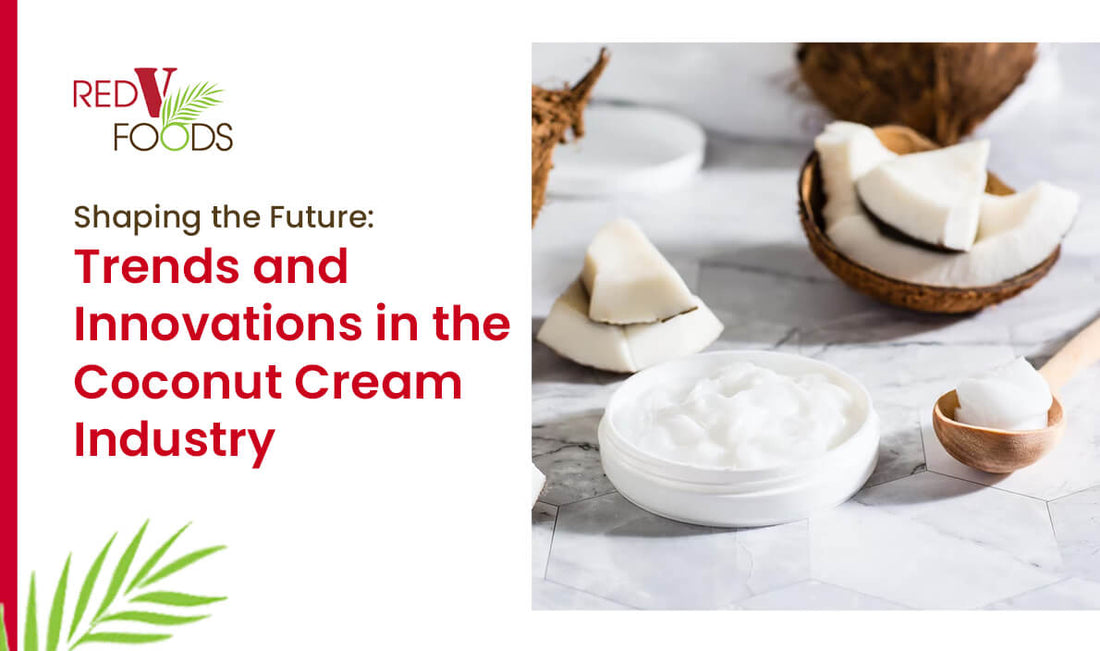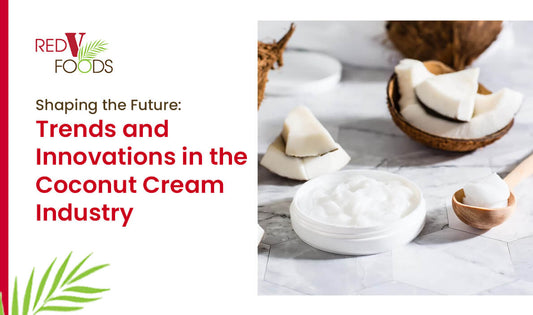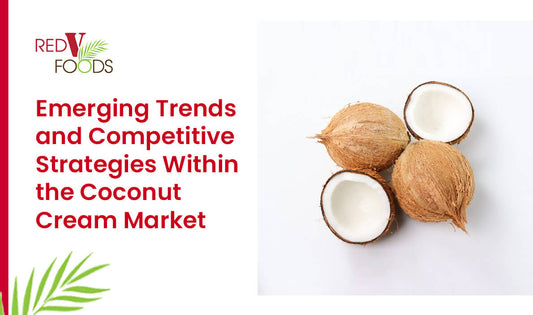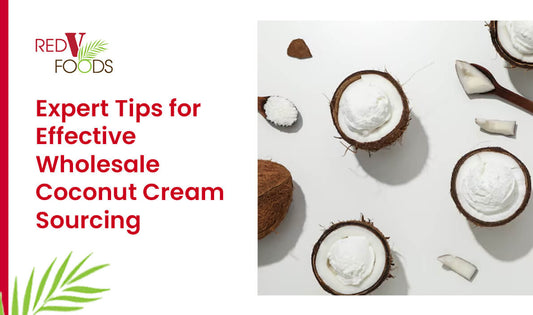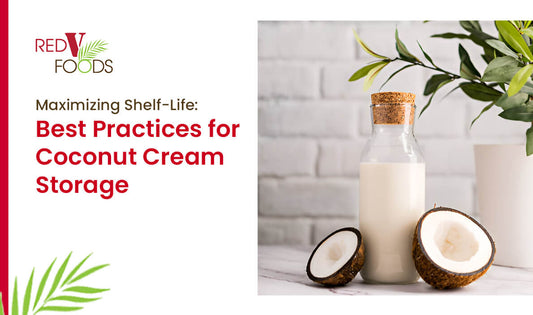- The coconut cream industry is expanding with a 7.2% projected CAGR, driven by plant-based diets, health benefits, and versatile applications.
- Key trends include product diversification, technological advancements, and R&D, while initiatives like the Sustainable Coconut Partnership address sustainability challenges.
- Red V Foods leads the market with high-quality, ethically sourced products, empowering customers to harness the industry’s growing potential.
The coconut cream industry is a thriving sector that has experienced remarkable growth in recent years, with an estimated compound annual growth rate (CAGR) of 7.2% over the next five years. This surge in demand can be attributed to the delectable taste, versatility, and numerous health benefits of coconut cream. As more consumers embrace plant-based diets and seek healthier alternatives, coconut cream has become a preferred choice across a variety of applications.
To capitalize on these opportunities, manufacturers and producers are investing in innovations across product diversification and technological advancements. By expanding their offerings and optimizing production methods, industry leaders aim to meet evolving consumer preferences and improve efficiency.
Beyond profitability, the coconut industry holds a significant moral and ethical responsibility. Coconut products have the potential to contribute meaningfully to alleviating food shortages and addressing global food insecurity. By adopting sustainable practices and responsible sourcing, the industry can ensure a steady supply of coconut cream, while supporting local communities and preserving the environment.
This article explores the emerging trends and groundbreaking innovations that are set to shape the future of the coconut cream market, providing insights into how industry leaders can stay ahead in this thriving sector.
The Growing Demand for Coconut Cream
The global demand for coconut cream has increased in recent years, fueled by a multitude of factors.
Rising Popularity of Plant-Based Diets
In a study by Sullivan et al. (2024), it was estimated that a proportion of U.S. adults consuming plant-based diets increased from 14.4% in 1999-2000 to 17.2% in 2017-March 2020. This rise in plant-based and vegan lifestyles, in addition to consumers’ growing awareness of the health benefits associated with coconut products has propelled coconut cream to the forefront of ingredient preferences.
Demographic Shifts Driving Demand
Changes in the demographics of the U.S., with the rapid growth of the Asian American population, projected to reach 35.8 million by 2060, also contributes to an increase in the demand for coconut creams. As these communities grow and their culinary influences spread, the demand for coconut cream-based foods naturally increases.
Versatility Beyond the Kitchen
The versatility of coconut cream has also allowed its application to not be limited to just culinary use. The cosmetic and personal care industries have embraced coconut cream as a natural and nourishing ingredient, incorporating it into a wide range of products, from moisturizers to hair conditioners.
This diversification of uses may have further contributed to the surge in demand, positioning coconut cream as a sought-after commodity worldwide.
Related Article: Unlocking the Power of Coconut Cream: A Comprehensive Guide to Its Benefits
Exploring Future Trends and Opportunities for Coconut Cream Market Growth
As the coconut cream industry evolves, emerging trends offer new opportunities for growth. Staying ahead allows producers to lead the market and meet diverse consumer preferences.
Here are key trends to watch out for:
Product Diversification
One of the most significant trends shaping the future of the coconut cream industry is product diversification or the development of value added products.
Consumers are increasingly seeking innovative and convenient products that cater to their unique dietary preferences and lifestyles. As a result, coconut manufacturers are exploring new ways to meet these diverse needs, in addition to the development of new food processing technologies that can also cater to these needs.
Product diversification for coconut cream can include a variety of innovative applications across different sectors. Here are some examples:
- Dairy Alternatives: Coconut cream can be used as a dairy substitute in products like non-dairy creamers, ice cream, yogurt, and cheese alternatives. These products cater to lactose-intolerant consumers and those following vegan diets.
- Condiments and Sauces: It can be utilized in the creation of creamy condiments and sauces such as coconut-based mayonnaise, salad dressings, curry pastes, or cooking sauces that appeal to those looking for exotic flavors or dairy-free options.
- Bakery and Confectionery: Coconut cream is excellent for use in baked goods such as cakes, pastries, and cookies to add a rich texture and distinct flavor. It can also be used in confectionery products like truffles, fudge, and custard-based desserts.
- Ready-to-Eat Meals: Coconut cream can be incorporated into ready-to-eat or pre-cooked meal kits like Thai curry, stews, or creamy soups. This provides convenience for consumers seeking authentic flavors without extensive cooking time.
- Beverages: It can be used to produce beverages such as smoothies, coconut lattes, or even ready-to-drink coconut cocktails. It adds a creamy consistency, making it popular in tropical drinks or plant-based dairy alternatives for coffee.
- Skincare and Cosmetics: Coconut cream can be used in beauty products like moisturizers, lotions, hair conditioners, and face masks. Its natural moisturizing properties make it a valuable ingredient for skin and hair care applications.
Related Article: Elevate Your Dishes with Coconut Cream: Delicious and Versatile Recipes
Technological Advancements
Technological advancements are also set to boost the coconut cream industry by streamlining production, improving efficiency, and enhancing quality. Innovations in automation, processing, and packaging are transforming how coconut cream is produced, stored, and distributed.
Some examples of technological advancements in the coconut cream industry include:
- Automated Harvesting and Processing: The integration of robotics and automation in coconut harvesting and processing can improve efficiency, reduce labor costs, and ensure consistent product quality.
- Advanced Extraction and Separation Techniques: Research is always in place to ensure the development of advanced technologies that can improve efficiency for extraction and separation. This in turn, helps enhance yield, purity, and quality of coconut cream and other products.
- Intelligent Packaging Solutions: The development of smart packaging solutions, such as active and intelligent packaging, can extend the shelf life of coconut cream products and provide real-time monitoring of product quality.
- Digital Supply Chain Management: The adoption of digital technologies, including the use of blockchain in agro-food supply chains, Internet of Things (IoT), and data analytics, can enhance supply chain transparency, traceability, and optimization.
- E-commerce Integration: Leveraging e-commerce platforms allows coconut cream manufacturers to reach a wider audience, streamline distribution, and offer direct-to-consumer sales. Digital storefronts, combined with data-driven marketing, can boost brand visibility and provide valuable consumer insights to optimize offerings and improve customer experience.
Related Article: Maximizing Shelf-Life: Best Practices for Coconut Cream Storage
Investment in Further Research and Development
To stay ahead and drive innovation, the coconut cream industry must invest in research and development. Continuous research can reveal new applications, enhance production methods, and uncover untapped market potential.
Areas of focus for R&D in the coconut cream industry may include:
- Product Innovation: Exploring new product formulations, flavor profiles, and applications to cater to evolving consumer preferences and market trends.
- Nutritional Enhancement: Investigating ways to fortify coconut cream with additional nutrients or functional ingredients to create value-added products with enhanced health benefits.
- Process Optimization: Developing more efficient and sustainable production processes that minimize waste, reduce energy consumption, and improve overall resource efficiency.
- Sustainability and Environmental Impact: Conducting research on regenerative agriculture practices, waste management strategies, and carbon footprint reduction techniques to enhance the sustainability of the coconut cream industry.
- Market Intelligence and Consumer Insights: Investing in market research and consumer behavior studies to better understand evolving consumer preferences, trends, and market dynamics.
Collaborative Efforts for Sustainability in the Coconut Cream Industry
Despite the demand and potential in the coconut cream industry, it faces a looming challenge: the potential for supply shortages. Concerns have arisen regarding the sustainability of coconut production, including the ability to meet the increasing demand, respond to climatic changes and yielding patterns, and address shortage of labor for coconut plucking, husking, and transportation, among others.
Recognizing this pressing issue, coconut companies and concerned organizations have taken proactive measures to address potential shortages and ensure a stable supply of coconut cream for the future. One such initiative involves the implementation of pre-competitive collaboration.
What is Pre-Competitive Collaboration?
Pre-competitive collaboration is a concept that encourages companies within the same industry to work together on non-competitive issues that benefit the entire sector. For the coconut cream industry, this collaboration focuses on addressing shared challenges, such as supply chain sustainability, resource efficiency, and environmental stewardship.
Spearheaded and advocated by the United States Agency for International Development (USAID) and other concerned organizations, coconut companies were encouraged to join the initiative ushered by the Sustainable Coconut Charter, to ensure sustainability in coconut production.
A Shift Towards Sustainable Practices
In tandem with pre-competitive collaboration, the coconut cream industry is actively embracing sustainable practices to safeguard the long-term viability of coconut production.
This shift towards sustainability is driven by a growing recognition of the environmental and social impacts associated with traditional farming methods, as well as the increasing consumer demand for responsibly sourced and ethically produced products.
Sustainable Coconut Partnership for a More Resilient Coconut Industry
Recognizing the importance of collective action, industry leaders, non-governmental organizations (NGOs), and stakeholders have come together to form the Sustainable Coconut Partnership (SCP).
Through collaborative efforts and a shared commitment to sustainability, the SCP aims to create a more resilient and equitable coconut industry, ensuring a stable supply of coconut cream, while preserving the natural resources and communities that support its production.
Be At the Forefront of the Coconut Industry With Red V Foods
The coconut cream industry stands at an exciting crossroads of growth and opportunity, driven by increasing global demand and the versatility of coconut products across sectors. However, with this growth comes the responsibility to ensure sustainability and resilience in the supply chain.
By embracing technological advancements and ongoing research and development, the industry can continue to innovate and meet consumer needs.
At Red V Foods, we strive to be at the forefront of the coconut cream industry, committed to providing our customers with high-quality, ethically sourced coconut cream products.
Whether you’re an e-commerce retailer seeking wholesale coconut cream in bulk or a manufacturer looking to incorporate our premium coconut cream into your product line, we have the expertise and resources to meet your needs.
Contact us today to learn more about our offerings and how we can help you stay ahead of the competition.
To know more about the latest in the coconut industry, visit our blog page.
Frequently Asked Questions (FAQs)
What are some emerging markets for coconut cream products?
The coconut cream market saw a global increase in demand, driven by plant-based diets and health trends, especially in North America and Europe. It has continuous growth and expanded beyond its traditional strongholds in the Asia-Pacific region, most notably in Southeast Asia, which are also the largest producers of coconut and coconut products.
How is the coconut cream industry adapting to regulatory changes?
The coconut cream industry is proactively adapting to consumer trends and regulations by enhancing food safety, improving labeling, prioritizing sustainability, and maintaining regulatory compliance.
What are the economic impacts of the coconut cream industry on local communities?
Consistent with efforts in promoting ethical and sustainable practices, the coconut cream industry boosts local economies in producing regions by creating jobs, supporting farmers, stimulating related industries, and contributing to community development.
How can the coconut cream industry incorporate e-commerce to reach new consumers?
E-commerce expands the coconut cream industry's reach and allows it to cater to a broader consumer base through direct-to-consumer platforms, partnerships with online retailers, efficient delivery systems, and digital marketing strategies.
References
- Coconut Development Board. (n.d.). Coconut Products. Retrieved November 8, 2024, from https://coconutboard.gov.in/CoconutProducts.aspx
- De la Rosa, R. J. (2022, July 25). The Philippines's food security and the coconut industry: Inquirer contributor. The Straits Times. https://www.straitstimes.com/asia/se-asia/the-philippiness-food-security-and-the-coconut-industry-inquirer-contributor
- Drago, E., Campardelli, R., Pettinato, M., & Perego, P. (2020). Innovations in smart packaging concepts for food: An extensive review. Foods, 9(11), 1628. https://doi.org/10.3390/foods9111628
- Hogg, A. (2021, June 9). Industry-level market reform in Southeast Asia: Spurring pre-competitive collaboration to green the coconut supply chain. Marketlinks. https://www.marketlinks.org/blogs/industry-level-market-reform-southeast-asia-spurring-pre-competitive-collaboration-green
- Grass Ramirez, J. F., Muñoz, R. C., & Zartha Sossa, J. W. (2023). Innovations and trends in the coconut agroindustry supply chain: A technological surveillance and foresight analysis. Frontiers in Sustainable Food Systems, 7, Article 1048450. https://doi.org/10.3389/fsufs.2023.1048450
- Köhler, S., Bager, S., & Pizzol, M. (2022). Sustainability standards and blockchain in agro-food supply chains: Synergies and conflicts. Technological Forecasting and Social Change, 185, 122094. https://doi.org/10.1016/j.techfore.2022.122094
- Marikkar, N., & Musthafa, M. M. (2022). The potential of coconut by-products to foster food security and sustainability in Sri Lanka. In M. Behnassi, H. Gupta, M. B. Baig, & I. R. Noorka (Eds.), The food security, biodiversity, and climate nexus (pp. 251-266). Springer. https://doi.org/10.1007/978-3-031-12586-7_12
- Mordor Intelligence. (2024). Coconut Cream Market Size & Share Analysis - Growth Trends & Forecasts (2024 - 2029). https://www.mordorintelligence.com/industry-reports/coconut-cream-market
- New Atlas. (2023, October 10). Amaran coconut-harvesting robot. Retrieved October 30, 2024, from https://newatlas.com/robotics/amaran-coconut-harvesting-robot/
- RK Sharma, OP Chauhan and JR Xavier. (2021). Technological Innovations in Food Processing and Value Addition to Coconut Journal of Food and Agriculture Research, 1: 1, pp. 69-85
- Sullivan, V. K., Martínez-Steele, E., Garcia-Larsen, V., & Rebholz, C. M. (2024). Trends in Plant-Based Diets among United States Adults, 1999–March 2020. The Journal of Nutrition. https://doi.org/10.1016/j.tjnut.2024.08.004
- Sustainable Coconut Partnership. (n.d.). About us. Retrieved October 29, 2024, from https://www.coconutpartnership.org/about-us
- Unilever. (2020). We are helping to create a more sustainable coconut industry. Retrieved October 29, 2024, from https://www.unilever.co.uk/news/2020/we-are-helping-to-create-a-more-sustainable-coconut-industry/

